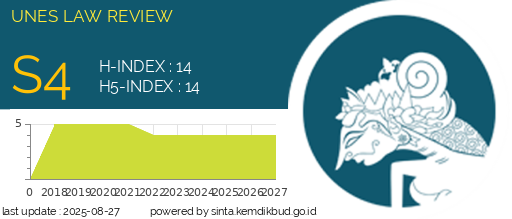Tinjauan Keabsahan Pelaksanaan Kontrak Elektronik di Indonesia Ditinjau dari Sistem Hukum Positif Indonesia
DOI:
https://doi.org/10.31933/unesrev.v6i2.1266Keywords:
Children, Death Penalty, Human RightsAbstract
With current technological developments, various new innovations have emerged in various aspects in various parts of the world. Then the aspect that is most affected by changes in the current technological era is the agreement or contract. Where changes to the agreement or contract lie in the medium where conventional contracts innovate into electronic contracts. Electronic contracts are often used in electronic transactions because they are more efficient. Positive law regarding electronic contracts is regulated in Civil Law and Law Number 19 of 2016 Amendments to Law Number 11 of 2008 concerning Information and Electronics. These two regulations explain the legal requirements for implementing a contract and the validity of a contract. The legal requirements for a contract are explained in Article 1320 of the Civil Code, namely that there is an agreement from both parties, the agreement must discuss a certain matter, the parties must have the skills to make an agreement, the agreement must have a valid reason, and the agreement must discuss a matter. certain. If the agreement meets these four conditions then the agreement is considered valid. Then, referring to Article 5 and Article 6 of the Electronic Information and Transactions Law, an electronic contract is declared valid if the electronic information in it can be guaranteed and its existence can be proven. The differences in the legal requirements for the two are not too different, only the electronic media is the difference. However, in its implementation, the Electronic Information and Transactions Law needs to strictly regulate the validity of electronic contracts.
Downloads
References
Amajihono, K. D. (2022). Kekuatan Hukum Kontrak Elektronik. Jurnal Panah Keadilan, 1(2), 128–139. https://doi.org/https://doi.org/10.57094/jpk.v1i2.458
Artanti, D. A., & Widiatno, M. W. (2020). Keabsahan Kontrak Elektronik Dalam Pasal 18 Ayat 1 UU I.T.E Ditinjau Dari Hukum Perdata Di Indonesia. JCA of Law, 1(1), 88–98.
Asyhadie, Z. (2006). Hukum Bisnis dan Pelaksanaannya di Indonesia. Raja Grafindo Persada.
Fuady, M. (2002). Pengantar Hukum Bisnis: Menata Bisnis Modern Di Era Global (1 ed.). Citra Aditya Bakti.
Kuspraningrum, E. (2020). Keabsahan Kontrak Elektronik Dalam UU ITE Ditinjau Dari Pasal 1320 KUHPerdata dan UNCITRAL Model Law On Electronic Commerce. Risalah Hukum, 7(2), 64–76.
Matheus, J. (2021). E-Arbitration: Digitization Of Business Dispute Resolution Pada Sektor E-Commerce Dalam Menyongsong Era Industri 4.0 Di Tengah Pandemi Covid-19. Lex Renaissance, 6(4), 692–704.
Subekti. (2005). Hukum Perjanjian (1 ed.). Intermasa.
Downloads
Published
How to Cite
Issue
Section
License
Hak cipta :
Penulis yang mempublikasikan manuskripnya di jurnal ini menyetujui ketentuan berikut:
- Hak cipta pada setiap artikel adalah milik penulis.
- Penulis mengakui bahwa UNES Law Review berhak menjadi yang pertama menerbitkan dengan lisensi Creative Commons Attribution 4.0 International (Attribution 4.0 International CC BY 4.0) .
- Penulis dapat mengirimkan artikel secara terpisah, mengatur distribusi non-eksklusif manuskrip yang telah diterbitkan dalam jurnal ini ke versi lain (misalnya, dikirim ke repositori institusi penulis, publikasi ke dalam buku, dll.), dengan mengakui bahwa manuskrip telah diterbitkan pertama kali di Jurnal UNES Law Review.



















